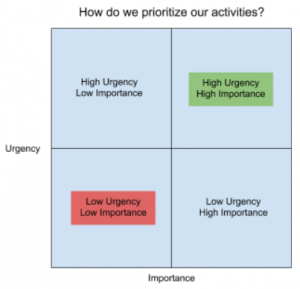“I’m so busy! Can we do this next week?” Said every student I have ever mentored. Some say it more than others, and I have certainly said it as well, but it brings up the important question, why not do it now?The obvious answer is because there are more important, more urgent things that need to be done first, so putting this meeting off for a week is a reasonable and logical time management action. Yet, it is important and we should get it done. So how and when will we actually get it done?I have found it useful to divide our evaluation of the work we have to do into an urgency scale and, separately, an importance scale. It’s good to put them on a 2x2 matrix:

It’s easy to decide to do the High Importance/High Urgency activities. Studying for a test the next day that counts for half of your grade for the semester is a no-brainer to prioritize. It’s also easy to put off the Low/Low activities, such as taking a nap. How, though, do we decide when to do the activities in the other two quadrants? I find that the work I do with students as a mentor most often falls in the lower right quadrant: we acknowledge the work we need to do is important, but it’s rarely urgent. If the college application is not due for two months, for example, editing one more time on Saturday is never urgent. Yet most of the other work my students are doing lies in the upper half of this matrix, and much of it in the upper left quadrant; urgent, but, in the grand scheme of things, not that important. As humans, we’re compelled to let urgency outweigh importance, and often this means we’re focused on the small stuff instead of the big picture.
So what do we do? #1 - Create a list somewhere, anywhere.
We can’t make tradeoffs if we don’t see what we’re trading off. I’ve made post it lists, I’ve put a to-do list up on a whiteboard, I keep emails as to do items, I’ve kept things in a calendar, I’ve kept them in a daily journal. It doesn’t matter where as long as it’s your list and you mean it.
#2 - Prioritize the list, manage it.
I like Post-Its and computer lists because you can move things around. One of my most organized students keeps Post-It—one per task—on the back of her bedroom door. She moves them around as priorities change, time passes, and things get done. And there is a special pile for the things that got done, and it’s really big.#2a) Some tasks are more complex than others—break them down into simpler tasks so you can acknowledge success as you make progress.
#3 - Forgive yourself.
We do urgent things because they cause stress. As a deadline nears and something is not done, anxiety builds. To be successful, however, we have to two the important things, and do them well. So forgive yourself if something not important but urgent doesn’t get done in favor of something more important. It’s ok, that’s the way it’s supposed to work.
#4 - Reward yourself.
Find something that brings you joy (or relief) and do it when you complete a task. Sometimes, the act of crossing off a to-do item is reward enough, or moving the post it to the “done” pile. Sometimes I reward myself by putting a fun task on the important and urgent pile. Because it is important to take breaks—to pause and celebrate a bit for a job well done.
#5 - Stick to the rule:
If it’s not on the list, it’s not happening; if it’s on, you will do your best to get it done within the priorities of the other items. This takes discipline. Back to the Post-It method, everything you need or want to do goes on a Post-It. Carry them with you during the day and organize them as soon as you get home from school. You’ll find that some things that seemed important when you wrote them down, are less important or lower priority than when you first wrote them. Manage this, compare to the notes that are already there when you get home. Prioritize first, then do. Ultimately, time and task management is a personal process you’ll hone over years and years, but this stressful, content-and-deadline-condensed semester is a great opportunity to practice these steps and help mitigate your stress levels. Remember: stay organized and envision your goals!